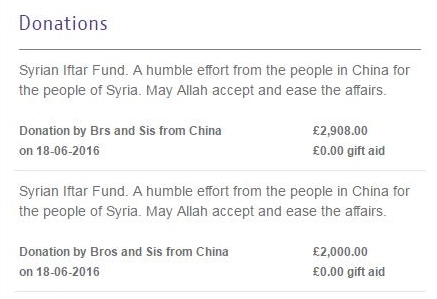Recently, we have been hearing distressing news regarding Muslims in China as certain states had banned fasting during Ramadan. So, when Muslim Council of Hong Kong received this piece of positive news, it was essential to let everyone know.
MCHK has been fundraising to provide support and relief to the people of Syria for many months by collaborating with One Nation, a registered charity organisation who have workers on the grounds inside Syria. With the month of mercy, Ramadan, MCHK started to call out to the Muslims in China to help with the Ramadan Iftar appeal and they responded amazingly.
Within the first week of Ramadan, more than HK$55,000 was generously raised and all of it, every cent of it, was sent to One Nation via MCHK’s Donate page. Most of the donations came from students within China and majority of them being Muslims. Some of the donations even came from Muslims living in the oppressed state Xinjiang.
One of the keys reasons given for such an amount being raised was that giving in charity during Ramadan comes with a high virtue:
“Allah’s Messenger was the most generous of all the people, and he used to reach the peak in generosity in the month of Ramadan when Jibril (Gabriel) met him…”[1]
Also, helping people to open their fasts has a great reward too:
“Whoever provides the food for a fasting person to break his fast with, then for him is the same reward as his (the fasting person’s), without anything being diminished from the reward of the fasting person.”[2]
Some of these donations were also part of their zakat contribution. Stories like these show us how the saying of Prophet Muhammad (peace be upon him) was indeed true:
“The similitude of believers in regard to mutual love, affection, fellow-feeling is that of one body; when any limb of it aches, the whole body aches, because of sleeplessness and fever.”[3]
We ask Allah to accept from everyone who has contributed and above all, we invoke Allah to ease the affairs of the Syrians and all other oppressed.
References
[1] Bukhari, 6
[2] Tirmidhi 807
[3] Ṣaḥīḥ al-Bukhārī 5665, Ṣaḥīḥ Muslim 2586






